Case Study: Legal Analysis of Will and Estate Distribution Scenarios
VerifiedAdded on 2022/11/01
|9
|2353
|158
Case Study
AI Summary
This case study analyzes the distribution of assets in a will, focusing on the scenarios presented by the death of beneficiaries before and after the testator, the validity of legacies, and the application of intestacy rules. The case involves Alvin Tan (AT), who created a will in 2002 and died in 2010. The will appointed executors, provided specific legacies to family and friends, and designated the residuary estate. The analysis covers how the deaths of executors and beneficiaries impact asset distribution, the treatment of specific and residuary legacies, and the implications of conditions precedent, such as a beneficiary reaching adulthood. It also examines the applicability of relevant legal principles, including the Intestate Succession Act and case law, to determine how the estate will be distributed among the surviving family members and the state. The case study addresses issues such as the validity of legacies when the specified bank account did not exist, the distribution of the residuary estate, and the effect of a beneficiary's death before reaching the age of majority, providing a detailed legal analysis of the complex scenarios presented.

will and estate CASE STUDIES
0 | P a g e
will and estate
Case Studies
0 | P a g e
will and estate
Case Studies
Paraphrase This Document
Need a fresh take? Get an instant paraphrase of this document with our AI Paraphraser
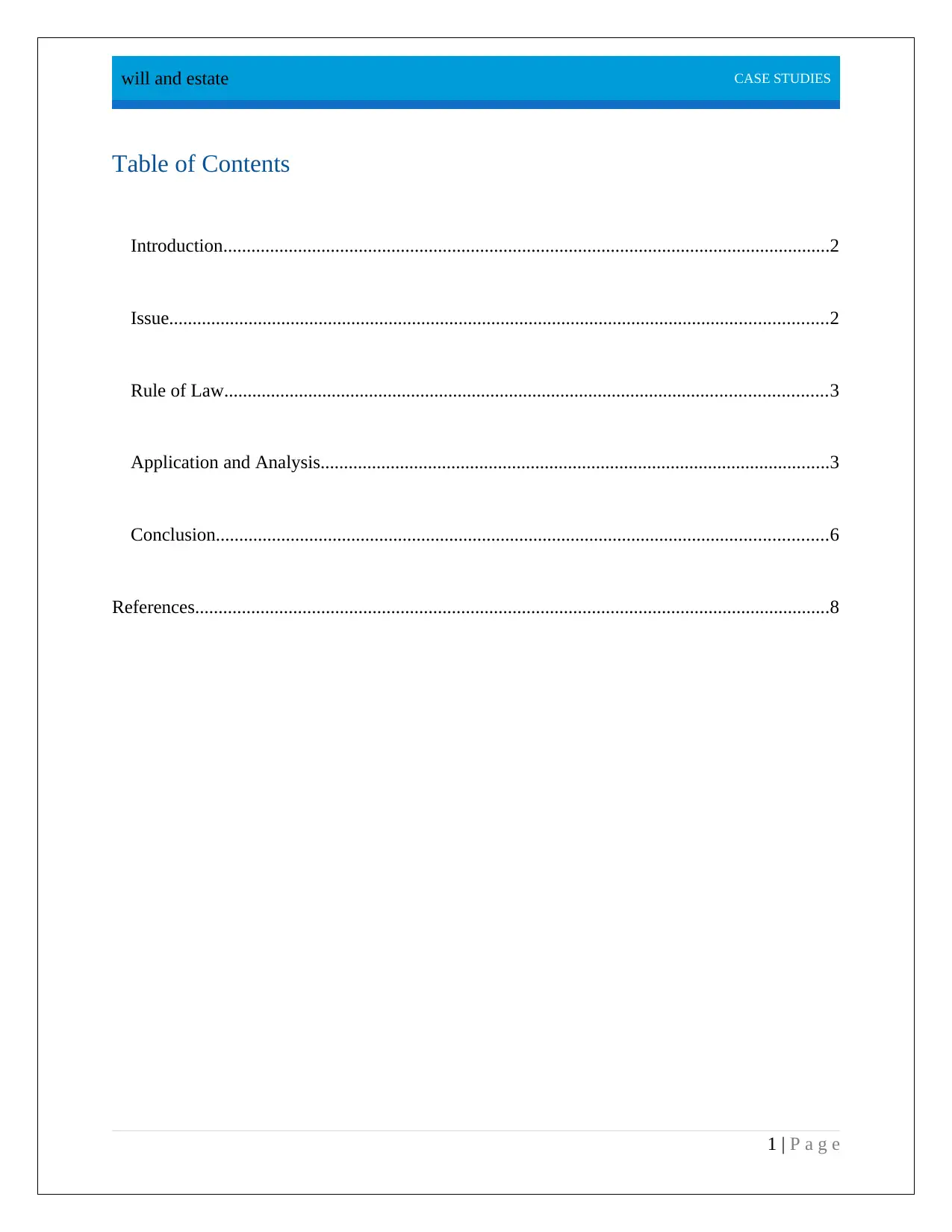
will and estate CASE STUDIES
Table of Contents
Introduction..................................................................................................................................2
Issue.............................................................................................................................................2
Rule of Law.................................................................................................................................3
Application and Analysis.............................................................................................................3
Conclusion...................................................................................................................................6
References........................................................................................................................................8
1 | P a g e
Table of Contents
Introduction..................................................................................................................................2
Issue.............................................................................................................................................2
Rule of Law.................................................................................................................................3
Application and Analysis.............................................................................................................3
Conclusion...................................................................................................................................6
References........................................................................................................................................8
1 | P a g e
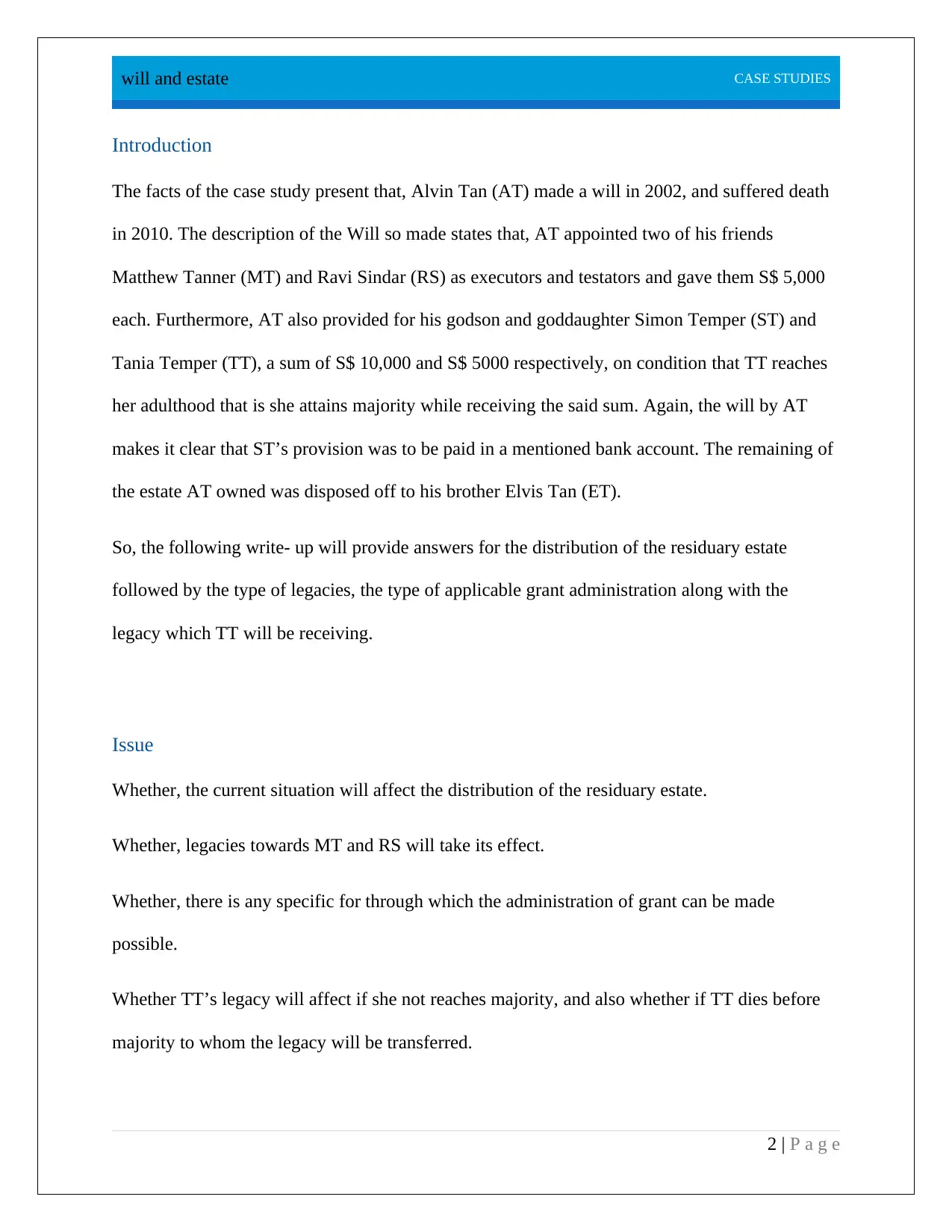
will and estate CASE STUDIES
Introduction
The facts of the case study present that, Alvin Tan (AT) made a will in 2002, and suffered death
in 2010. The description of the Will so made states that, AT appointed two of his friends
Matthew Tanner (MT) and Ravi Sindar (RS) as executors and testators and gave them S$ 5,000
each. Furthermore, AT also provided for his godson and goddaughter Simon Temper (ST) and
Tania Temper (TT), a sum of S$ 10,000 and S$ 5000 respectively, on condition that TT reaches
her adulthood that is she attains majority while receiving the said sum. Again, the will by AT
makes it clear that ST’s provision was to be paid in a mentioned bank account. The remaining of
the estate AT owned was disposed off to his brother Elvis Tan (ET).
So, the following write- up will provide answers for the distribution of the residuary estate
followed by the type of legacies, the type of applicable grant administration along with the
legacy which TT will be receiving.
Issue
Whether, the current situation will affect the distribution of the residuary estate.
Whether, legacies towards MT and RS will take its effect.
Whether, there is any specific for through which the administration of grant can be made
possible.
Whether TT’s legacy will affect if she not reaches majority, and also whether if TT dies before
majority to whom the legacy will be transferred.
2 | P a g e
Introduction
The facts of the case study present that, Alvin Tan (AT) made a will in 2002, and suffered death
in 2010. The description of the Will so made states that, AT appointed two of his friends
Matthew Tanner (MT) and Ravi Sindar (RS) as executors and testators and gave them S$ 5,000
each. Furthermore, AT also provided for his godson and goddaughter Simon Temper (ST) and
Tania Temper (TT), a sum of S$ 10,000 and S$ 5000 respectively, on condition that TT reaches
her adulthood that is she attains majority while receiving the said sum. Again, the will by AT
makes it clear that ST’s provision was to be paid in a mentioned bank account. The remaining of
the estate AT owned was disposed off to his brother Elvis Tan (ET).
So, the following write- up will provide answers for the distribution of the residuary estate
followed by the type of legacies, the type of applicable grant administration along with the
legacy which TT will be receiving.
Issue
Whether, the current situation will affect the distribution of the residuary estate.
Whether, legacies towards MT and RS will take its effect.
Whether, there is any specific for through which the administration of grant can be made
possible.
Whether TT’s legacy will affect if she not reaches majority, and also whether if TT dies before
majority to whom the legacy will be transferred.
2 | P a g e
⊘ This is a preview!⊘
Do you want full access?
Subscribe today to unlock all pages.

Trusted by 1+ million students worldwide
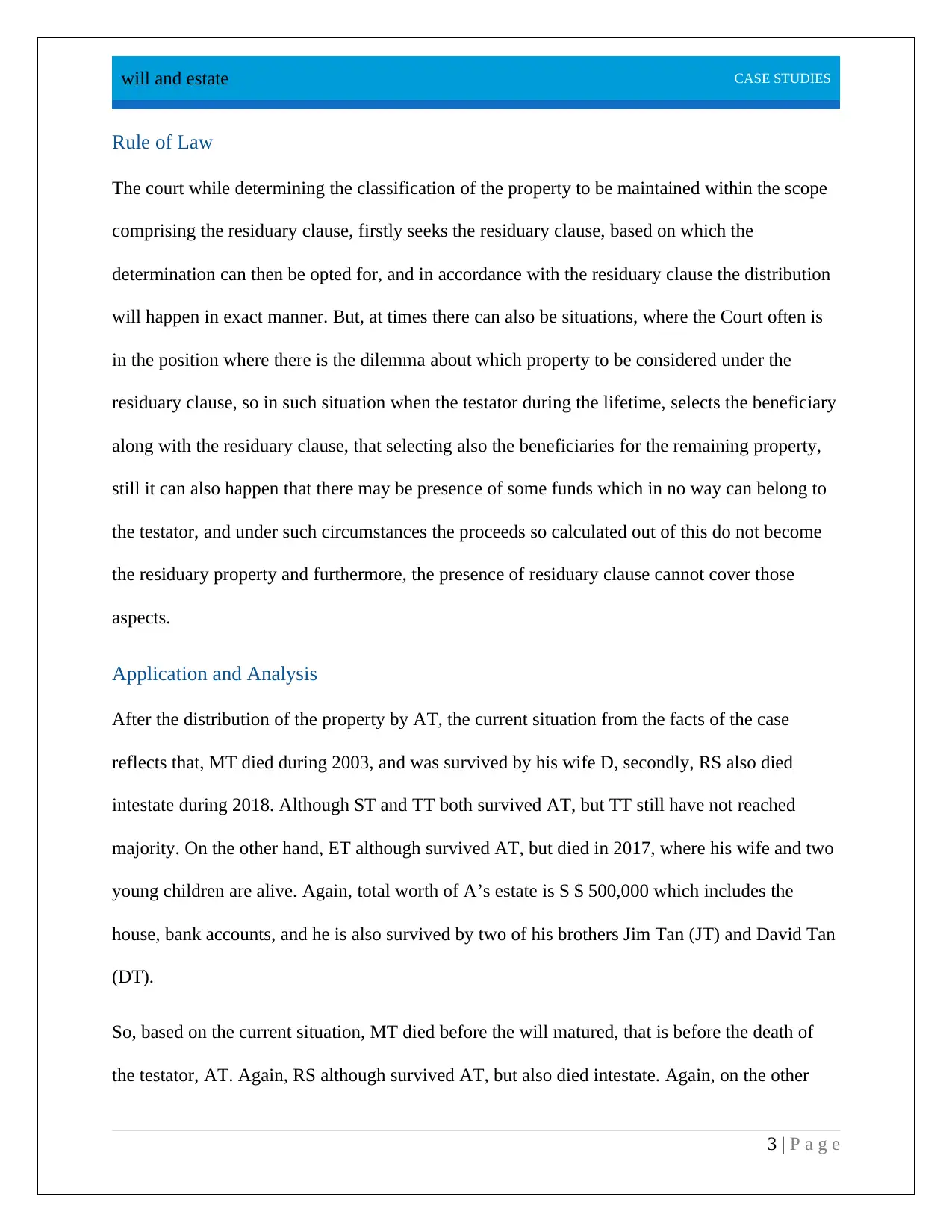
will and estate CASE STUDIES
Rule of Law
The court while determining the classification of the property to be maintained within the scope
comprising the residuary clause, firstly seeks the residuary clause, based on which the
determination can then be opted for, and in accordance with the residuary clause the distribution
will happen in exact manner. But, at times there can also be situations, where the Court often is
in the position where there is the dilemma about which property to be considered under the
residuary clause, so in such situation when the testator during the lifetime, selects the beneficiary
along with the residuary clause, that selecting also the beneficiaries for the remaining property,
still it can also happen that there may be presence of some funds which in no way can belong to
the testator, and under such circumstances the proceeds so calculated out of this do not become
the residuary property and furthermore, the presence of residuary clause cannot cover those
aspects.
Application and Analysis
After the distribution of the property by AT, the current situation from the facts of the case
reflects that, MT died during 2003, and was survived by his wife D, secondly, RS also died
intestate during 2018. Although ST and TT both survived AT, but TT still have not reached
majority. On the other hand, ET although survived AT, but died in 2017, where his wife and two
young children are alive. Again, total worth of A’s estate is S $ 500,000 which includes the
house, bank accounts, and he is also survived by two of his brothers Jim Tan (JT) and David Tan
(DT).
So, based on the current situation, MT died before the will matured, that is before the death of
the testator, AT. Again, RS although survived AT, but also died intestate. Again, on the other
3 | P a g e
Rule of Law
The court while determining the classification of the property to be maintained within the scope
comprising the residuary clause, firstly seeks the residuary clause, based on which the
determination can then be opted for, and in accordance with the residuary clause the distribution
will happen in exact manner. But, at times there can also be situations, where the Court often is
in the position where there is the dilemma about which property to be considered under the
residuary clause, so in such situation when the testator during the lifetime, selects the beneficiary
along with the residuary clause, that selecting also the beneficiaries for the remaining property,
still it can also happen that there may be presence of some funds which in no way can belong to
the testator, and under such circumstances the proceeds so calculated out of this do not become
the residuary property and furthermore, the presence of residuary clause cannot cover those
aspects.
Application and Analysis
After the distribution of the property by AT, the current situation from the facts of the case
reflects that, MT died during 2003, and was survived by his wife D, secondly, RS also died
intestate during 2018. Although ST and TT both survived AT, but TT still have not reached
majority. On the other hand, ET although survived AT, but died in 2017, where his wife and two
young children are alive. Again, total worth of A’s estate is S $ 500,000 which includes the
house, bank accounts, and he is also survived by two of his brothers Jim Tan (JT) and David Tan
(DT).
So, based on the current situation, MT died before the will matured, that is before the death of
the testator, AT. Again, RS although survived AT, but also died intestate. Again, on the other
3 | P a g e
Paraphrase This Document
Need a fresh take? Get an instant paraphrase of this document with our AI Paraphraser
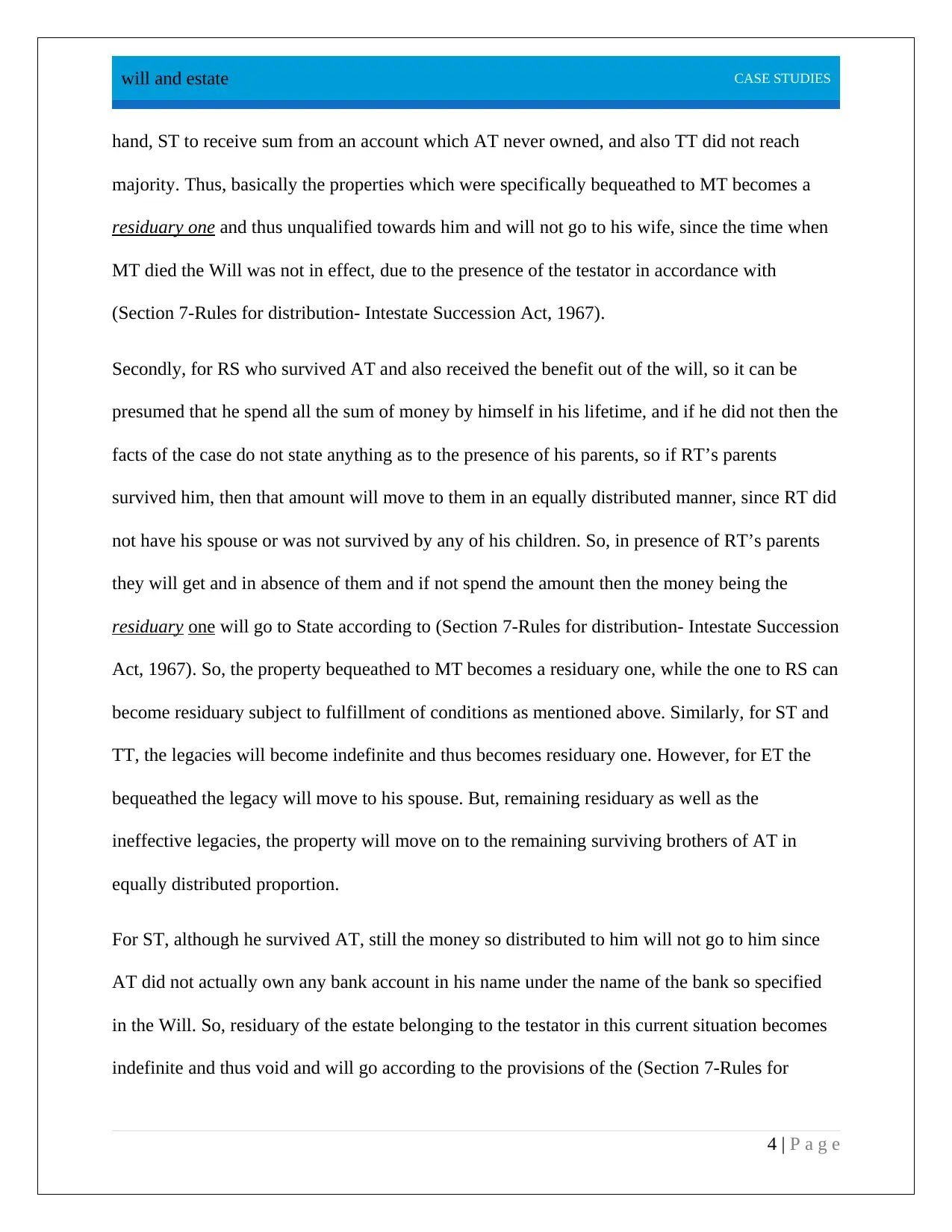
will and estate CASE STUDIES
hand, ST to receive sum from an account which AT never owned, and also TT did not reach
majority. Thus, basically the properties which were specifically bequeathed to MT becomes a
residuary one and thus unqualified towards him and will not go to his wife, since the time when
MT died the Will was not in effect, due to the presence of the testator in accordance with
(Section 7-Rules for distribution- Intestate Succession Act, 1967).
Secondly, for RS who survived AT and also received the benefit out of the will, so it can be
presumed that he spend all the sum of money by himself in his lifetime, and if he did not then the
facts of the case do not state anything as to the presence of his parents, so if RT’s parents
survived him, then that amount will move to them in an equally distributed manner, since RT did
not have his spouse or was not survived by any of his children. So, in presence of RT’s parents
they will get and in absence of them and if not spend the amount then the money being the
residuary one will go to State according to (Section 7-Rules for distribution- Intestate Succession
Act, 1967). So, the property bequeathed to MT becomes a residuary one, while the one to RS can
become residuary subject to fulfillment of conditions as mentioned above. Similarly, for ST and
TT, the legacies will become indefinite and thus becomes residuary one. However, for ET the
bequeathed the legacy will move to his spouse. But, remaining residuary as well as the
ineffective legacies, the property will move on to the remaining surviving brothers of AT in
equally distributed proportion.
For ST, although he survived AT, still the money so distributed to him will not go to him since
AT did not actually own any bank account in his name under the name of the bank so specified
in the Will. So, residuary of the estate belonging to the testator in this current situation becomes
indefinite and thus void and will go according to the provisions of the (Section 7-Rules for
4 | P a g e
hand, ST to receive sum from an account which AT never owned, and also TT did not reach
majority. Thus, basically the properties which were specifically bequeathed to MT becomes a
residuary one and thus unqualified towards him and will not go to his wife, since the time when
MT died the Will was not in effect, due to the presence of the testator in accordance with
(Section 7-Rules for distribution- Intestate Succession Act, 1967).
Secondly, for RS who survived AT and also received the benefit out of the will, so it can be
presumed that he spend all the sum of money by himself in his lifetime, and if he did not then the
facts of the case do not state anything as to the presence of his parents, so if RT’s parents
survived him, then that amount will move to them in an equally distributed manner, since RT did
not have his spouse or was not survived by any of his children. So, in presence of RT’s parents
they will get and in absence of them and if not spend the amount then the money being the
residuary one will go to State according to (Section 7-Rules for distribution- Intestate Succession
Act, 1967). So, the property bequeathed to MT becomes a residuary one, while the one to RS can
become residuary subject to fulfillment of conditions as mentioned above. Similarly, for ST and
TT, the legacies will become indefinite and thus becomes residuary one. However, for ET the
bequeathed the legacy will move to his spouse. But, remaining residuary as well as the
ineffective legacies, the property will move on to the remaining surviving brothers of AT in
equally distributed proportion.
For ST, although he survived AT, still the money so distributed to him will not go to him since
AT did not actually own any bank account in his name under the name of the bank so specified
in the Will. So, residuary of the estate belonging to the testator in this current situation becomes
indefinite and thus void and will go according to the provisions of the (Section 7-Rules for
4 | P a g e
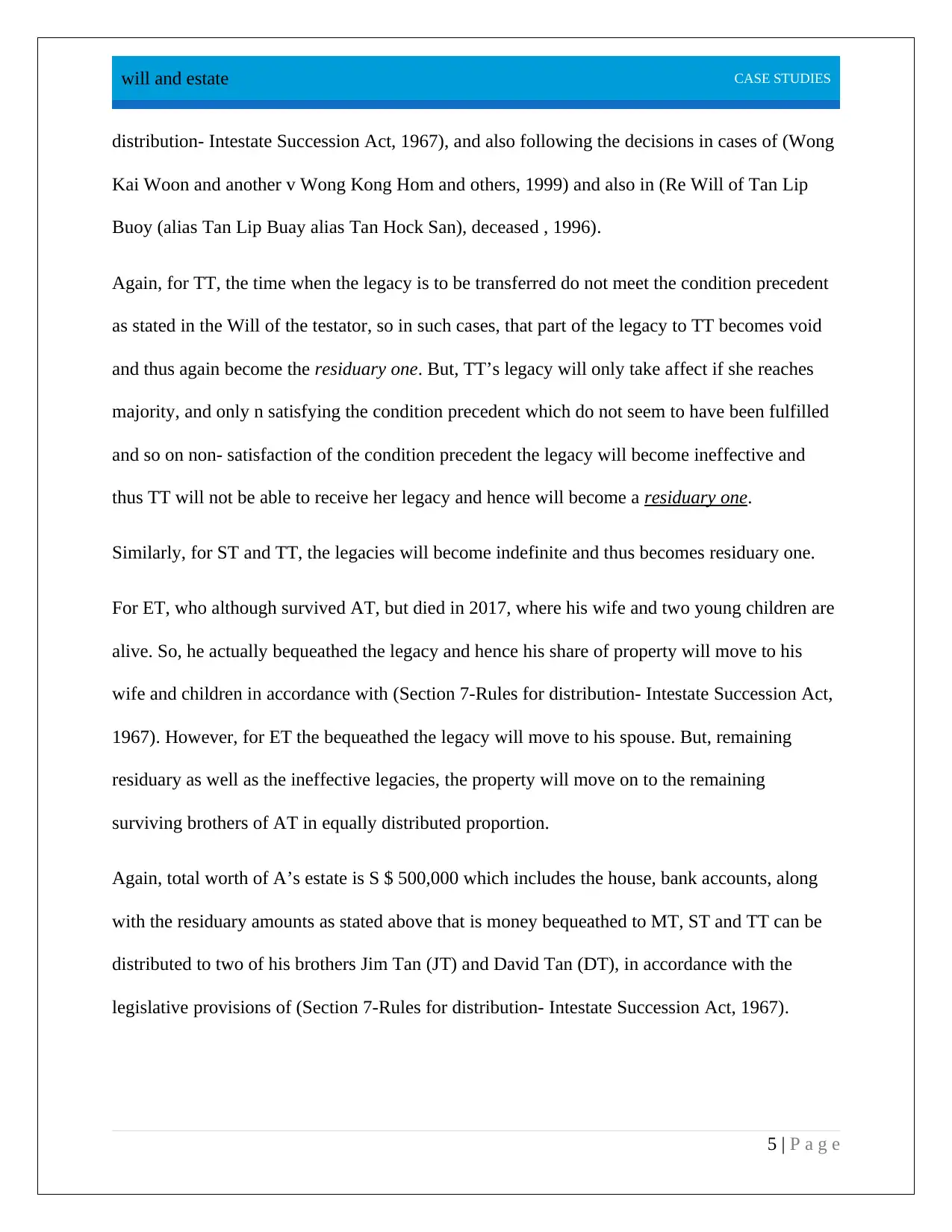
will and estate CASE STUDIES
distribution- Intestate Succession Act, 1967), and also following the decisions in cases of (Wong
Kai Woon and another v Wong Kong Hom and others, 1999) and also in (Re Will of Tan Lip
Buoy (alias Tan Lip Buay alias Tan Hock San), deceased , 1996).
Again, for TT, the time when the legacy is to be transferred do not meet the condition precedent
as stated in the Will of the testator, so in such cases, that part of the legacy to TT becomes void
and thus again become the residuary one. But, TT’s legacy will only take affect if she reaches
majority, and only n satisfying the condition precedent which do not seem to have been fulfilled
and so on non- satisfaction of the condition precedent the legacy will become ineffective and
thus TT will not be able to receive her legacy and hence will become a residuary one.
Similarly, for ST and TT, the legacies will become indefinite and thus becomes residuary one.
For ET, who although survived AT, but died in 2017, where his wife and two young children are
alive. So, he actually bequeathed the legacy and hence his share of property will move to his
wife and children in accordance with (Section 7-Rules for distribution- Intestate Succession Act,
1967). However, for ET the bequeathed the legacy will move to his spouse. But, remaining
residuary as well as the ineffective legacies, the property will move on to the remaining
surviving brothers of AT in equally distributed proportion.
Again, total worth of A’s estate is S $ 500,000 which includes the house, bank accounts, along
with the residuary amounts as stated above that is money bequeathed to MT, ST and TT can be
distributed to two of his brothers Jim Tan (JT) and David Tan (DT), in accordance with the
legislative provisions of (Section 7-Rules for distribution- Intestate Succession Act, 1967).
5 | P a g e
distribution- Intestate Succession Act, 1967), and also following the decisions in cases of (Wong
Kai Woon and another v Wong Kong Hom and others, 1999) and also in (Re Will of Tan Lip
Buoy (alias Tan Lip Buay alias Tan Hock San), deceased , 1996).
Again, for TT, the time when the legacy is to be transferred do not meet the condition precedent
as stated in the Will of the testator, so in such cases, that part of the legacy to TT becomes void
and thus again become the residuary one. But, TT’s legacy will only take affect if she reaches
majority, and only n satisfying the condition precedent which do not seem to have been fulfilled
and so on non- satisfaction of the condition precedent the legacy will become ineffective and
thus TT will not be able to receive her legacy and hence will become a residuary one.
Similarly, for ST and TT, the legacies will become indefinite and thus becomes residuary one.
For ET, who although survived AT, but died in 2017, where his wife and two young children are
alive. So, he actually bequeathed the legacy and hence his share of property will move to his
wife and children in accordance with (Section 7-Rules for distribution- Intestate Succession Act,
1967). However, for ET the bequeathed the legacy will move to his spouse. But, remaining
residuary as well as the ineffective legacies, the property will move on to the remaining
surviving brothers of AT in equally distributed proportion.
Again, total worth of A’s estate is S $ 500,000 which includes the house, bank accounts, along
with the residuary amounts as stated above that is money bequeathed to MT, ST and TT can be
distributed to two of his brothers Jim Tan (JT) and David Tan (DT), in accordance with the
legislative provisions of (Section 7-Rules for distribution- Intestate Succession Act, 1967).
5 | P a g e
⊘ This is a preview!⊘
Do you want full access?
Subscribe today to unlock all pages.

Trusted by 1+ million students worldwide
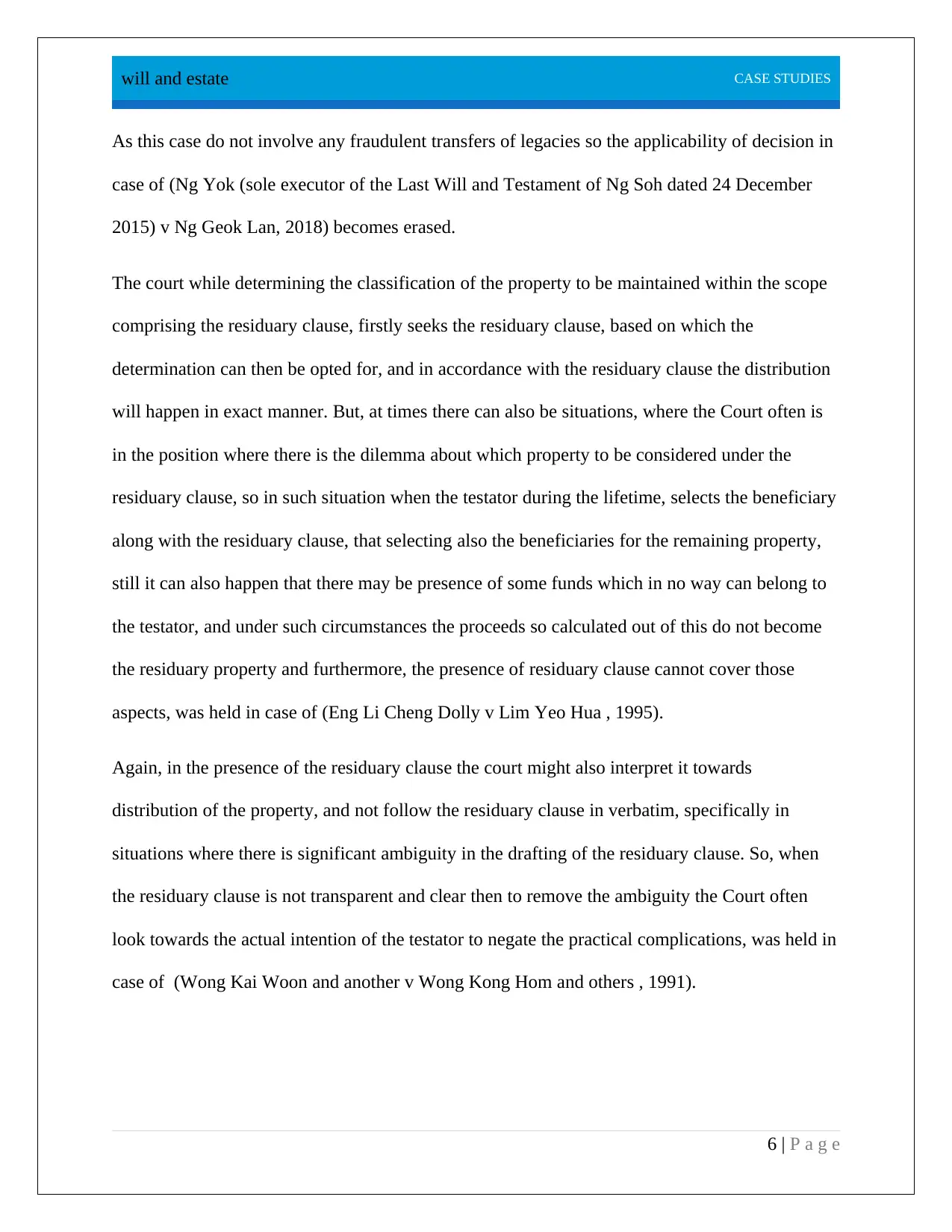
will and estate CASE STUDIES
As this case do not involve any fraudulent transfers of legacies so the applicability of decision in
case of (Ng Yok (sole executor of the Last Will and Testament of Ng Soh dated 24 December
2015) v Ng Geok Lan, 2018) becomes erased.
The court while determining the classification of the property to be maintained within the scope
comprising the residuary clause, firstly seeks the residuary clause, based on which the
determination can then be opted for, and in accordance with the residuary clause the distribution
will happen in exact manner. But, at times there can also be situations, where the Court often is
in the position where there is the dilemma about which property to be considered under the
residuary clause, so in such situation when the testator during the lifetime, selects the beneficiary
along with the residuary clause, that selecting also the beneficiaries for the remaining property,
still it can also happen that there may be presence of some funds which in no way can belong to
the testator, and under such circumstances the proceeds so calculated out of this do not become
the residuary property and furthermore, the presence of residuary clause cannot cover those
aspects, was held in case of (Eng Li Cheng Dolly v Lim Yeo Hua , 1995).
Again, in the presence of the residuary clause the court might also interpret it towards
distribution of the property, and not follow the residuary clause in verbatim, specifically in
situations where there is significant ambiguity in the drafting of the residuary clause. So, when
the residuary clause is not transparent and clear then to remove the ambiguity the Court often
look towards the actual intention of the testator to negate the practical complications, was held in
case of (Wong Kai Woon and another v Wong Kong Hom and others , 1991).
6 | P a g e
As this case do not involve any fraudulent transfers of legacies so the applicability of decision in
case of (Ng Yok (sole executor of the Last Will and Testament of Ng Soh dated 24 December
2015) v Ng Geok Lan, 2018) becomes erased.
The court while determining the classification of the property to be maintained within the scope
comprising the residuary clause, firstly seeks the residuary clause, based on which the
determination can then be opted for, and in accordance with the residuary clause the distribution
will happen in exact manner. But, at times there can also be situations, where the Court often is
in the position where there is the dilemma about which property to be considered under the
residuary clause, so in such situation when the testator during the lifetime, selects the beneficiary
along with the residuary clause, that selecting also the beneficiaries for the remaining property,
still it can also happen that there may be presence of some funds which in no way can belong to
the testator, and under such circumstances the proceeds so calculated out of this do not become
the residuary property and furthermore, the presence of residuary clause cannot cover those
aspects, was held in case of (Eng Li Cheng Dolly v Lim Yeo Hua , 1995).
Again, in the presence of the residuary clause the court might also interpret it towards
distribution of the property, and not follow the residuary clause in verbatim, specifically in
situations where there is significant ambiguity in the drafting of the residuary clause. So, when
the residuary clause is not transparent and clear then to remove the ambiguity the Court often
look towards the actual intention of the testator to negate the practical complications, was held in
case of (Wong Kai Woon and another v Wong Kong Hom and others , 1991).
6 | P a g e
Paraphrase This Document
Need a fresh take? Get an instant paraphrase of this document with our AI Paraphraser
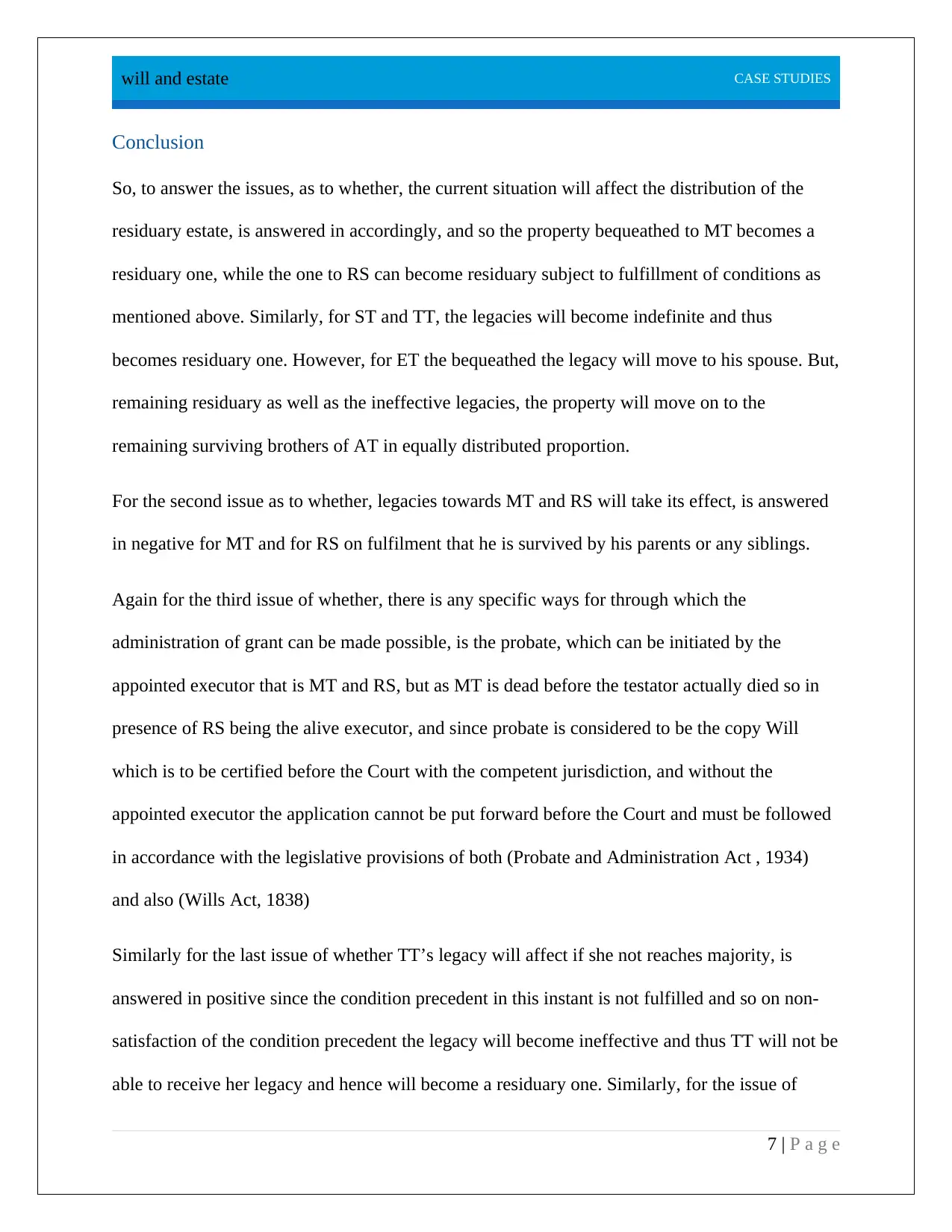
will and estate CASE STUDIES
Conclusion
So, to answer the issues, as to whether, the current situation will affect the distribution of the
residuary estate, is answered in accordingly, and so the property bequeathed to MT becomes a
residuary one, while the one to RS can become residuary subject to fulfillment of conditions as
mentioned above. Similarly, for ST and TT, the legacies will become indefinite and thus
becomes residuary one. However, for ET the bequeathed the legacy will move to his spouse. But,
remaining residuary as well as the ineffective legacies, the property will move on to the
remaining surviving brothers of AT in equally distributed proportion.
For the second issue as to whether, legacies towards MT and RS will take its effect, is answered
in negative for MT and for RS on fulfilment that he is survived by his parents or any siblings.
Again for the third issue of whether, there is any specific ways for through which the
administration of grant can be made possible, is the probate, which can be initiated by the
appointed executor that is MT and RS, but as MT is dead before the testator actually died so in
presence of RS being the alive executor, and since probate is considered to be the copy Will
which is to be certified before the Court with the competent jurisdiction, and without the
appointed executor the application cannot be put forward before the Court and must be followed
in accordance with the legislative provisions of both (Probate and Administration Act , 1934)
and also (Wills Act, 1838)
Similarly for the last issue of whether TT’s legacy will affect if she not reaches majority, is
answered in positive since the condition precedent in this instant is not fulfilled and so on non-
satisfaction of the condition precedent the legacy will become ineffective and thus TT will not be
able to receive her legacy and hence will become a residuary one. Similarly, for the issue of
7 | P a g e
Conclusion
So, to answer the issues, as to whether, the current situation will affect the distribution of the
residuary estate, is answered in accordingly, and so the property bequeathed to MT becomes a
residuary one, while the one to RS can become residuary subject to fulfillment of conditions as
mentioned above. Similarly, for ST and TT, the legacies will become indefinite and thus
becomes residuary one. However, for ET the bequeathed the legacy will move to his spouse. But,
remaining residuary as well as the ineffective legacies, the property will move on to the
remaining surviving brothers of AT in equally distributed proportion.
For the second issue as to whether, legacies towards MT and RS will take its effect, is answered
in negative for MT and for RS on fulfilment that he is survived by his parents or any siblings.
Again for the third issue of whether, there is any specific ways for through which the
administration of grant can be made possible, is the probate, which can be initiated by the
appointed executor that is MT and RS, but as MT is dead before the testator actually died so in
presence of RS being the alive executor, and since probate is considered to be the copy Will
which is to be certified before the Court with the competent jurisdiction, and without the
appointed executor the application cannot be put forward before the Court and must be followed
in accordance with the legislative provisions of both (Probate and Administration Act , 1934)
and also (Wills Act, 1838)
Similarly for the last issue of whether TT’s legacy will affect if she not reaches majority, is
answered in positive since the condition precedent in this instant is not fulfilled and so on non-
satisfaction of the condition precedent the legacy will become ineffective and thus TT will not be
able to receive her legacy and hence will become a residuary one. Similarly, for the issue of
7 | P a g e

will and estate CASE STUDIES
whether if TT dies before majority, then the provision of (Section 7-Rules for distribution-
Intestate Succession Act, 1967), will be followed and as she will be survived by her parents as
well as her brother ST, so the legacy will be transferred to them accordingly.
8 | P a g e
whether if TT dies before majority, then the provision of (Section 7-Rules for distribution-
Intestate Succession Act, 1967), will be followed and as she will be survived by her parents as
well as her brother ST, so the legacy will be transferred to them accordingly.
8 | P a g e
⊘ This is a preview!⊘
Do you want full access?
Subscribe today to unlock all pages.

Trusted by 1+ million students worldwide
1 out of 9
Related Documents
Your All-in-One AI-Powered Toolkit for Academic Success.
+13062052269
info@desklib.com
Available 24*7 on WhatsApp / Email
![[object Object]](/_next/static/media/star-bottom.7253800d.svg)
Unlock your academic potential
Copyright © 2020–2026 A2Z Services. All Rights Reserved. Developed and managed by ZUCOL.



